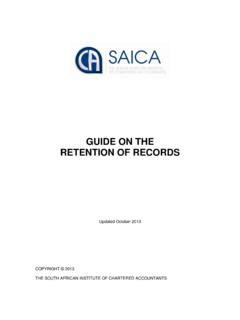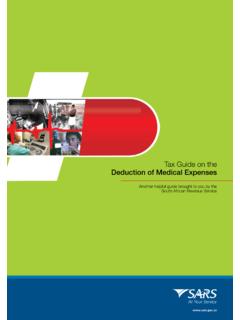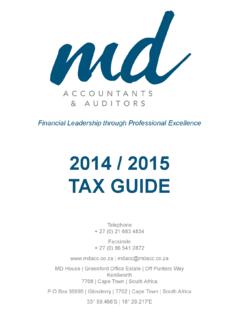Transcription of AGRO-PROCESSING SUPPORT SCHEME (APSS)
1 Milbloem 11 (Pty) Ltd t/as Enterprise Development Consultants Reg No. 2004/020162/07 Director: J C Watson AGRO-PROCESSING SUPPORT SCHEME (APSS) The DTI launched the AGRO-PROCESSING SUPPORT SCHEME in May 2017. AGRO-PROCESSING Beneficiation entails changing the form of a product originating from agriculture, forestry and fisheries. The DTI will accept applications from 1 June 2017. The DTI have adopted an application window approach and applications can be submitted from 1 June 2017 31 August 2017 and 1 October 2017 31 January 2018. Future window periods will be published on the DTI website. Applicants can take the form of South African registered Companies (inc Branches, Divisions & Profit Centres), Close Corporations or Co-Operatives. The objective of the incentive is to stimulate investment by South African AGRO-PROCESSING / beneficiation enterprises. Qualifying Processes / Projects: The incentives are available to New and Expanding AGRO-PROCESSING / Beneficiation Projects.
2 This can involve a wide range of post-harvest beneficiation activities such as cleaning, sorting, grading, waxing, controlled ripening, labelling, packing, warehousing, canning and freezing. The forestry value chain includes processes such as sawing, pulping, peeling, wood carving and preservation. Five Key Subsectors: - Food and Beverage value addition and processing Products that originated from Agriculture, Forestry and Fisheries (including black wine makers) - Furniture Manufacturing - Fibre processing - Feed Production - Fertilizer Mandatory Conditions: Applicants must be: - A South African registered legal entity (Company, Close Corporation or Co-Operative). Divisions, Branches and Profit Centres are also eligible to apply. - Be a Tax Payer in Good Standing - Involved in a New / Expanding AGRO-PROCESSING Beneficiation Operation - Must be at least Level 4 BEE compliant - Investment project must result in retaining and creating direct employment - The project must be able to boost the local capacity of identified products or result in increased exports - Adhere to sectorial legislative requirements as well as minimum wage legislation - Demonstrate that at least 50% of inputs (raw materials) will be sourced from South African suppliers and at least 30% of the inputs will be sourced from Black South African suppliers.
3 Where this is not possible, applicants must provide a motivation including a sourcing plan to adhere to this condition within 2 years from the submission of the application. - Activities must commence within 90 calendar days of the approval of the application - Costs Incurred before Approval are regarded as Non-Qualifying Grant Offering: The programme offers a cost sharing grant of between 20% - 30% of Qualifying Assets / Competitiveness Improvement Costs up to a maximum incentive of R 20m over a two-year claim period. See table below: Applicant Historical Cost of Assets Qualifying Investment Grant Percentage Maximum Grant New Entity N/A R1m R10m 30% R 3m New Entity N/A >R10m 20% R20m Existing Entity < / = R10m R1m R10m 30% R3m Existing Entity >R10m >R10m 20% R20m From the above table, it is evident that an existing entity with historical assets at cost in excess of R10m must spend at least R10m on qualifying assets / competitiveness costs in order to qualify for APSS incentives.
4 The DTI may consider an additional 10% grant for projects that meet all of the following Economic Benefit Criteria: Employment: - Increase Base Year Employment by at least 25% Transformation: - Achieve a Level 1 BEE Score Geographical Spread: - Projects located in state owned industrial parks or areas with unemployment higher than 25% Local Procurement: - Procuring at least 70% of inputs or equipment and machinery that is locally manufactured Qualifying Assets and Investment Costs: - New Plant & Machinery (inc Tools, Forklifts, Moulds, Green Technology, Energy and Resource Efficiency Equipment) - New Commercial Vehicles (inc collection, delivery and distribution vehicles) - Buildings Excluding Land - Competitiveness Improvement Costs Conformity Assessment Certification (Quality & Environmental Management Improvement, Process Capability and Product Quality Improvement plus Accreditation Costs. Information Technology and Logistics Systems Software for Integrated Production Management Information Systems)



